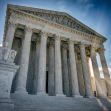In a six-to-three vote, the Supreme Court ruled that states are barred from excluding religious schools from state-run tuition assistance programs if the states offer these programs to other private schools. This decision along with others recently published by the Court leads to questions on how far the First Amendment rights stretch to protect the Freedom of Religion clause.
Chief Justice John G. Roberts Jr. wrote for the majority stating that the ruling did not require states to support religious education. Still, they also cannot discriminate against religious schools if they choose to subsidize private schools in their state. Justice Sonia Sotomayor, on the other hand, dissented and called it another crack in the “wall of separation between church and state that the framers fought to build.”
The Maine state government has a program that assists in tuition for school districts that do not have a secondary school of their own. These school districts are usually in the rural areas of Maine. Parents may decide which secondary school they wish their child to attend, but one of the state requirements is that it must be a “nonsectarian” school. Families residing in these school districts brought this lawsuit as they found it against their Constitutional right to be denied a public benefit because they chose a religious school.
Two schools named in the lawsuit, Temple Academy and Bangor Christian Schools, expect their students “to spread the word of Christianity” and “to integrate biblical principles with their teaching in every subject.” Both schools also “require their students to be born-again Christians” and have policies that allow them to discriminate in their enrollment based on gender identity, sexual orientation, and religion.
While the Supreme Court mandated that if a state provides tuition assistance to private schools it may not preclude religious institutions, it does not require students or parents to choose those religious schools.
Rachel Laser, the President and CEO of Americans United for Separation of Church and State, released a statement condemning the Supreme Court decision blaming “the ultra-conservative majority of the U.S. Supreme Court.” She continues to argue that “the court is forcing taxpayers to fund religious education” by allowing parents to receive tuition assistance if they choose to send their children to religious schools.
Justice Sotomayor commented that the Supreme Court has seen a drastic shift from “a rule that permits States to decline to fund religious organizations to one that requires States in many circumstances to subsidize religious indoctrination with taxpayer dollars.”
In a similar decision, Espinoza v Montana Department of Revenue, Chief Justice Roberts wrote “A state need not subsidize private education. But once a state decides to do so, it cannot disqualify some private schools solely because they are religious.” However, this case focused on the school’s curriculum rather than its religious status. Chief Justice further wrote in this decision that “the curriculum taught at participating private schools need not even resemble that taught in the Maine public schools,” opening the doors for other religious institutions or other school philosophies to also receive governmental funding.
Justice Breyer dissented that to offer a “civic education,” schools must be “religiously neutral, neither disparaging nor promoting any one particular system of religious beliefs.”
Under the First Amendment of the U.S. Constitution, “Congress shall make no law respecting an establishment of religion.” This establishment clause, or the separation of church or state, guarantees that any local, state or federal government entity may not establish a government-endorsed church or religion.
However, this is not the first time the Supreme Court has ruled in favor of allowing public funds to be used for sending students to receive a religious education. Under the interpretation of “the neutrality test,” the government is required to give equal treatment to religious and non-religious groups. In 2002, the Supreme Court ruled in a 5-4 division, in Zelman v. Simmons-Harris, that Ohio’s school voucher program could be used to send students to religious schools.






